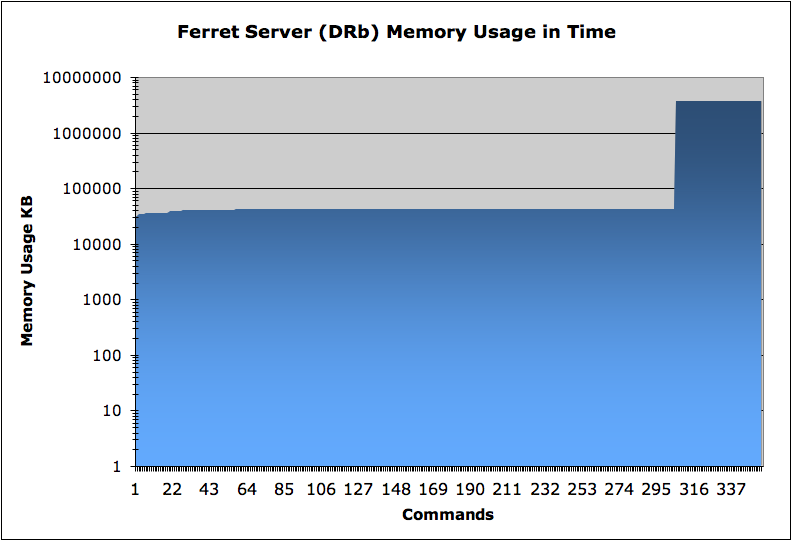Now I was able to reproduce the error.
Analyzing a series of logs when the memory allocation jump happens I
discovered a pattern: the jump occurs when the query string contains
‘accented characters’. Specially when the query has the U with accents
in the end.
So, after searching for “fas jús”, “videos nús” and others it causes the
allocated memory to instantly jump from ~40MB to ~3.7GB and fail on the
next search with similar queries.
Also, I noted that on the ferret_server.log que query appears sometimes
different with extras chars on its ends, see:
I searched for “fas jús” and the log showed this: call index method:
find_id_by_contents with ["faz j?s ",
{:sort=>[posted_at_sort:!], :offset=>0, :limit=>10}] - server
memory: 36288 KB
In the next call we could see that the memory jump just happened: call
index method: find_id_by_contents with [“PORTA ABERTA”,
{:sort=>[posted_at_sort:!], :offset=>0, :limit=>10}] - server
memory: 3720856 KB
Again, when searching for “videos manús” the log shows “video man?s(?”
(not the garbage in the end). And the memory jumped to 3.7GB.
Then searching for “urubús” the log shows "urub?s " (note the extra
spaces) and the server fails with the FATAL error.
Once I could also got this message on the DRb server:
/opt/csw/lib/ruby/1.8/drb/drb.rb:941: warning: setvbuf() can’t be
honoured (fd=37)
Finally a sequence alternating the accented char to á, é, Ã, ó and ú to
see if the same happens with other chars. But it only happened with the
U accented and not the other chars, see:
[Sun Apr 08 17:26:09 BRT 2007] Info > Starting…
QUERY “deverás” > call index method: find_id_by_contents with
[“dever?s”, {:sort=>[posted_at_sort:!], :offset=>0,
:limit=>10}] - server memory: 30744 KB
QUERY “deverés” > call index method: find_id_by_contents with
[“dever?s”, {:sort=>[posted_at_sort:!], :offset=>0,
:limit=>10}] - server memory: 34168 KB
QUERY “deverÃs” > call index method: find_id_by_contents with
[“dever?s”, {:sort=>[posted_at_sort:!], :offset=>0,
:limit=>10}] - server memory: 34956 KB
QUERY “deveros” > call index method: find_id_by_contents with [“dever?”,
{:sort=>[posted_at_sort:!], :offset=>0, :limit=>10}] - server
memory: 35156 KB
QUERY “deverús” > call index method: find_id_by_contents with ["dever?s
", {:sort=>[posted_at_sort:!], :offset=>0, :limit=>10}] -
server memory: 35696 KB ===> MEMORY JUMP & GARBAGE ON LOG!!!
QUERY “jump”> call index method: find_id_by_contents with [“jump”,
{:sort=>[posted_at_sort:!], :offset=>0, :limit=>10}] - server
memory: 3724812 KB <<< THIS IS THE MEMORY AFTER THE “deverús” QUERY!!!
